What do you think of when you hear the words, “Iron Discipline” and “Unwavering Willpower”? Superheroes? Some guys at the gym? A trusted Mentor?
Such qualities of great strength, endurance and self control can often seem out of reach. It might seem as if it’s something others are able to achieve, but may be too hard to find for ourselves. If you’re looking outside of yourself, you may struggle to find what you’re looking for, because those qualities come from within.
You’re probably already aware of the benefits of discipline and willpower. You already have a sense that you want to develop it. You already know what it looks like. But it may seem unattainable.
Well, it’s not. It’s about making yourself accountable. It’s about being totally honest with yourself. Retired Navy Seal David Goggins said,
“The most important conversation is the one you have with yourself.”
So maybe it’s time to call it like it is. Don’t sugar coat it. Don’t hide from it. It’s work. It’s dedication. It’s mind and action together with solid principles and integrity. Are you ready?
Start with Basic Discipline
Starting with everyday habits and routines is the first step. It may seem like the things you do daily are not significant when you have big goals of iron discipline and unwavering willpower, but starting small is more important than you might think.
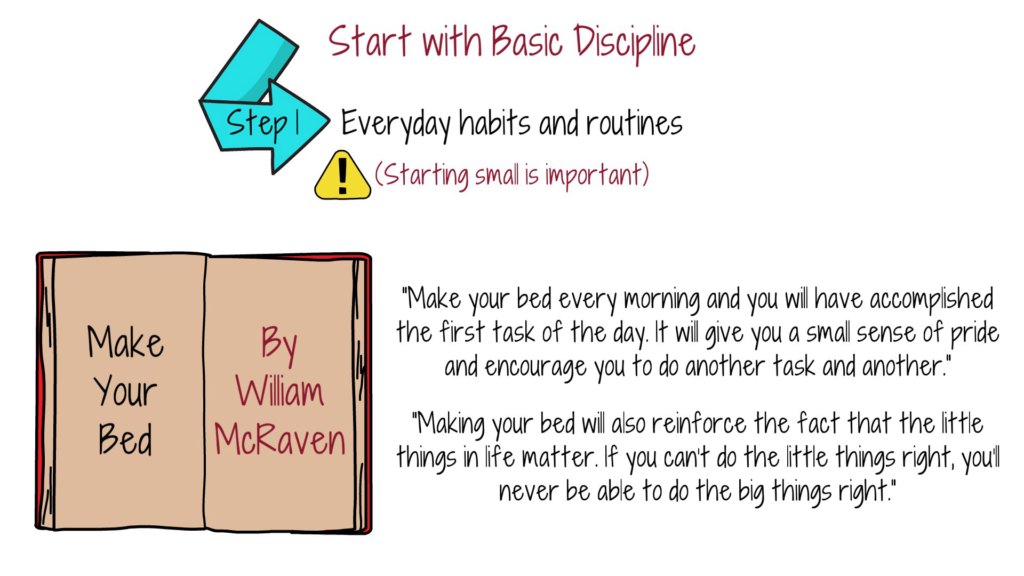
In his book, Make Your Bed, Admiral William McRaven wrote,
“Make your bed every morning and you will have accomplished the first task of the day. It will give you a small sense of pride and encourage you to do another task and another.”
He continues,
“Making your bed will also reinforce the fact that the little things in life matter. If you can’t do the little things right, you’ll never be able to do the big things right.”
Even your eating habits can be a small but significant decision that may impact your health and daily routine. A consistent diet of healthful foods can establish discipline and provide an opportunity to develop ongoing willpower.
When you start with small steps, you make progress toward bigger goals. Set goals that are clear and specific. You can’t be disciplined if you don’t have something in sight to achieve.
Picture your goal at all times. Visualize it. Believe it. Know that the outcome is going to be dependent on what you’re doing NOW, and stick to that plan.
What’s Your Purpose?
So how do you choose a goal? You don’t want to just choose some random thing that doesn’t mean much to you, or what you think everyone else is doing.
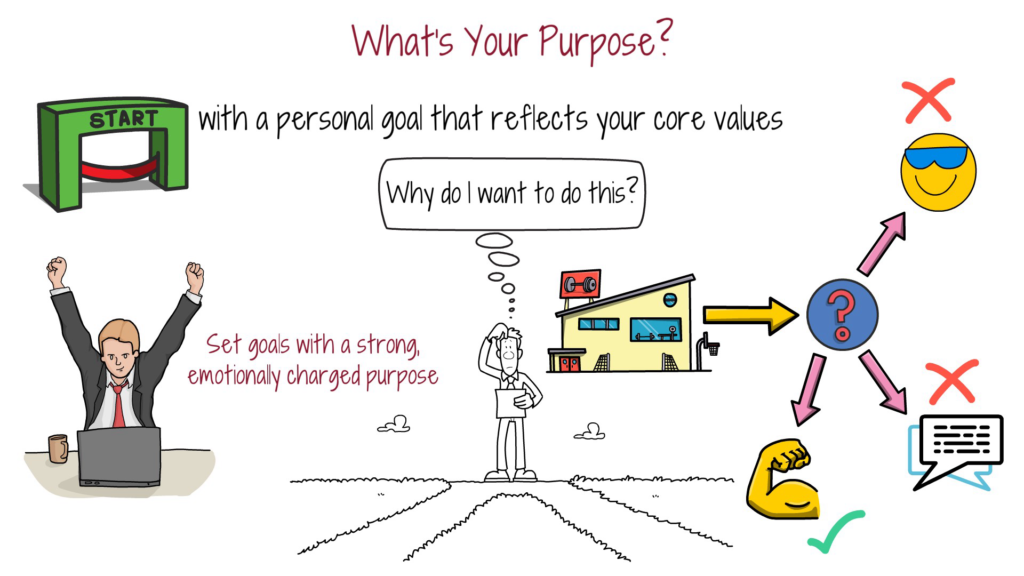
Having a personal goal that reflects your core values is a good place to start. Ask yourself WHY you want to do this. Think about what makes you want to get out of bed in the morning. Set goals with a strong, emotionally charged purpose. When you attach your goal to something meaningful, you are more likely to achieve it.
For example, if working out at the gym is your goal, ask yourself why you want to do that. If it’s because it makes you look cool, or somebody told you to do it, that’s not a good reason. It won’t carry you very far and you’ll get bored with it. But if it’s because you want to be strong and healthy so you can do things you love to do, that’s another story.
Likewise, if you’re doing it because you want to set a good example for your kids, watch them grow up, and show them what determination looks like, then you have an emotional component to it.
On his podcast, Norse Mentality, Andy Lewis suggests that you make the possibility of failure so epic that you will succeed at all costs. When you have that emotional attachment to the outcome, it might give you an extra boost of support to keep going, even when it’s difficult.
As you progress and become successful on a regular basis, you’ll start seeing more benefits. You may feel better, look better, and develop more confidence.
The Logic of Willpower
Continuing toward your goal and being consistent with your daily routines and habits can be hard at times. But staying on course will mean the difference between failure and success. Let’s say it’s 5am, and your alarm clock goes off. Are you going to count on “feeling” like getting up? Your brain’s job is to try and keep you comfortable. It’s going to want to sleep a little longer. It might tell you to try again tomorrow. But don’t listen to it. Take control of your brain. Embrace discomfort and focus on long term benefits.
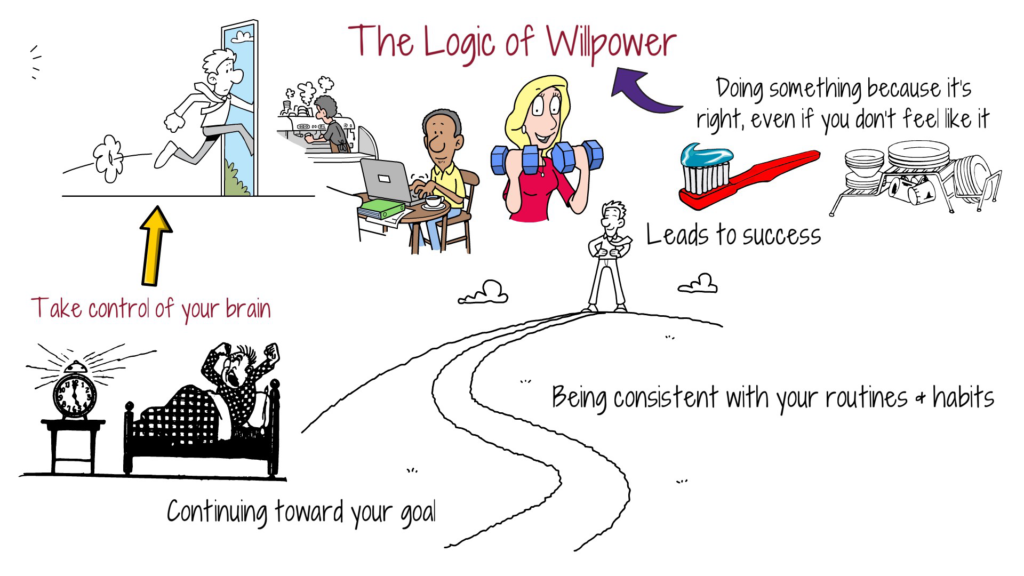
Willpower is a matter of logic and good sense. When you do something because it’s the right thing to do, even if you don’t especially feel like it at the moment, you’re using willpower.
For example, you may not always feel like brushing your teeth, or washing dishes. But you do it because it makes sense. You’ll see long term benefits when you take care of yourself. The same is true when you apply that same logic to working out, or doing a job. You don’t need to overthink it. Just do it. If it aligns with your long term goals for your life and your health, then you can override any obstacle or challenge. You do what you need to do because that’s your policy.
Strengthening willpower through self control exercises can also be helpful. Taking control of your impulses, even for short periods, can build willpower and help you push through uncomfortable feelings. For example, taking a cold shower can build stamina to endure physical discomfort. Or if that’s too extreme, try switching the water to cold for 30 seconds at the end of the shower.
Even small milestones can help strengthen willpower and cultivate mental resilience. Tell yourself, “one more step”, when you’re struggling to keep going. Just one more step. Take it one step at a time and eventually you’ll get to the top.
Kristoff Kjelby, Personal Trainer and PowerLifter, explains how to “Level Up” by using the “Law of Progressive Overload.” He stated that when you push yourself farther than your comfort level, you gain momentum to do even more. When what you’re doing becomes easy, you can move up to the next level. This technique can apply to both mental and physical goals.
Eliminate Victim Mentality
Chronic complaining doesn’t solve anything. You may have had hard times. Most people do. But it’s up to you to move past it.
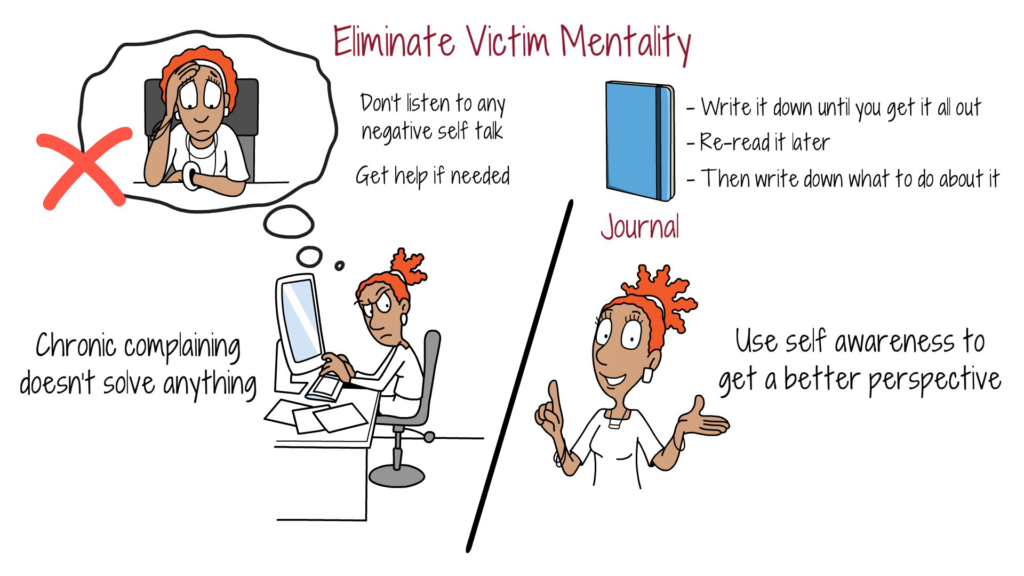
Using self awareness can help sort out your feelings and get a better perspective. One way to do that is to get the energy moving, whether physically or mentally. Writing in a journal can get things flowing. Write it down. Keep writing till you get it all out. And then re-read it later and see if you still feel the same way. On another paper, write down what you can do about it.
Self sabotage can be a detriment to confidence and discipline. Be your own best friend. Don’t listen to any negative self talk. Use self awareness to identify problems and then do something about it, including getting professional help if needed.
Make It Your Default Mode
When you first started thinking about what changes you wanted to make in your life, you may have originally been motivated by frustration or disappointment. Those are two contributing factors that often bring people to the point of starting something new. But it’s important not to stay in that state of mind. Allow your catalysts to initiate change and then move forward with a positive attitude.
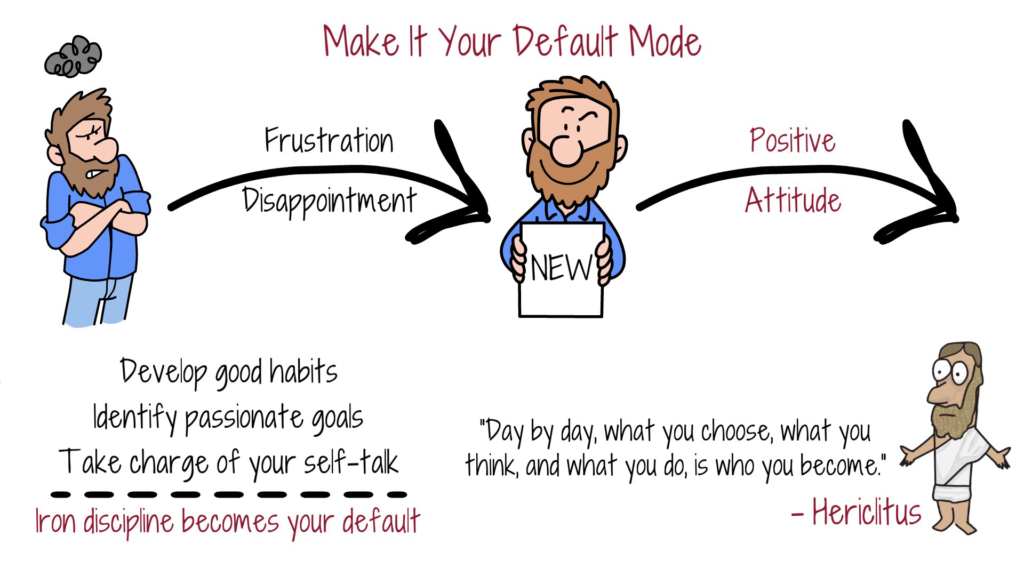
Once you develop good habits and routines, identify passionate goals and take charge of your self-talk, then iron discipline and unwavering willpower can become your default position.
Make it your core personality and model of behavior. You do what you do, because it’s who you are now.
Greek Philosopher Hericlitus wrote,
“Day by day, what you choose, what you think, and what you do, is who you become.”
Who will you become?
